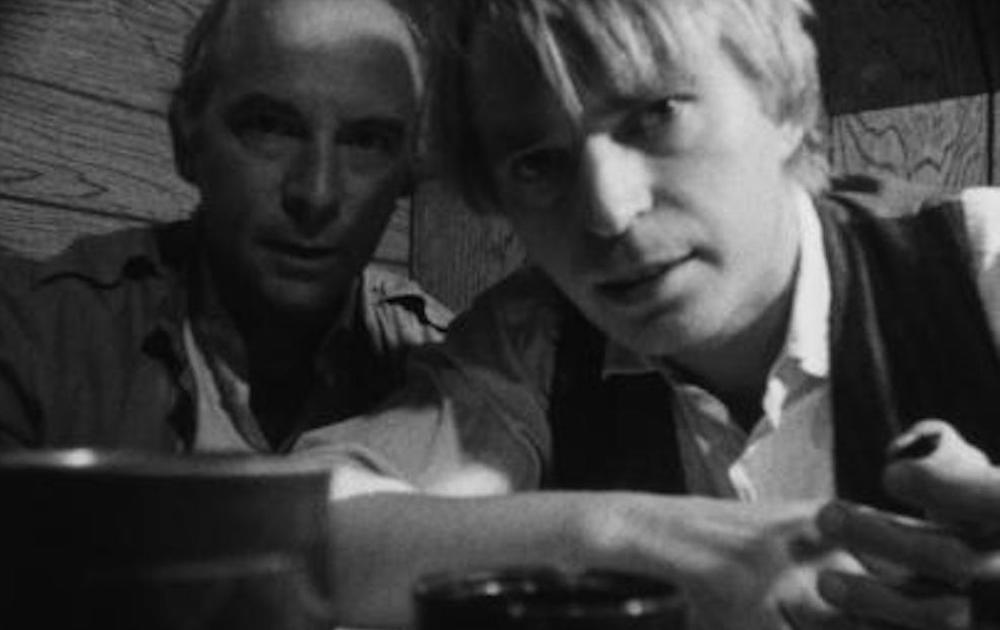VIDEONALE.scope #4

50 Years of Underground Film on the Rhine
VIDEONALE.scope presents a selection of classic and new works by the film makers Wilhelm Hein and Lutz Mommartz.
A film series hosted by the Videonale Bonn
Curated by Daniel Kothenschulte
Lutz Mommartz
1967 was a year of utopian impulses. In Düsseldorf, a senior inspector at the state building authority decided he wanted to become an experimental film maker. He got hold of a 16mm camera, and by the time the deadline came around for the important avant-garde film festival in the Belgian town of Knokke, he had four short films ready to submit. Three of his films were accepted, two of which played in competition. His film “Self Shots” [“Selbstschüsse”] won second prize, beaten only by Michael Snow’s classic “Wavelength”. Practically overnight, the 33-year-old Lutz Mommartz had made a name for himself in the small but cosmopolitan world of experimental film. Mommartz (born 1934) continued working as a senior building inspector for seven years, after which he dedicated himself entirely to film. From 1978 until 1999, he was Professor of Film at the Academy of Art in Münster.
Birgit Hein
Also in competition at Knokke were husband and wife filmmakers Birgit and Wilhelm Hein from Cologne. “Knokke played a big role in the grounding of XSCREEN”, Birgit later recalled. “It was there that we started inviting international filmmakers to come to Cologne".
In 2013, VIDEONALE.scope devoted a comprehensive film series to Birgit Hein. This year, Videonale Bonn is pleased to welcome Wilhelm Hein and Lutz Mommartz to Cologne. Almost five decades after the explosion of moving image art which shook the world in 1967, we offer you the opportunity for an encounter with two avant-garde filmmakers from the Rhineland who have continued working in the medium until the present day.
n 2013, Wilhelm Hein (born 1940), whose work together with Birgit Hein has twice been exhibited at Documenta (1972 and 1977), completed his epic 16mm experimental film “You Killed the Undergroundfilm or The Real Meaning of Kunst bleibt ...bleibt...”, a film he had been working on since 2002. For the first time, two excerpts from the ca. 12-hour long film will be screened in Cologne, flanked by the world premieres of Hein’s latest video works, “Tohuwabohu Big and Small, Rolls 23 and 96” [“Das große und das kleine Tohuwabohu, Rolle 23 und 96”]. Additionally, his 16mm work “Double Projections 1-4” will be screened with live musical accompaniment. Hein’s autobiographically tinged film work brings together a vast array of avant-garde filmmaking’s expressive techniques. Found-footage, structural elements and documentary images merge to form performative montages which are constantly renewed by the accompanying sound collages. Hein, who is personally overseeing the screenings in Cologne, is one of the world’s leading exponents of film performance.
In Lutz Mommartz’s work, every single image counts, though the severity of formal perfection is tempered by his playful, neo-Dadaist approach. Each of his early films is entirely different from the last, and is based on a completely new idea. With apparent naivety, he constantly reinvents cinema. In “Self Shots” [“Selbstschüsse”] (1967), he throws his camera up in the air and catches it. As he himself put it, it was his way of “showing my animosity to the film tradition, and leaping beyond my own limits”. In “Railway” [“Eisenbahn”] (1967), an apparently endless landscape rolling past train window turns out to be an illusion produced using a skillfully mounted endless loop. Michel Gondry used the same idea in his 2007 music video “Star Guitar”. Many of Germany’s most important film critics, including Uwe Nettelbeck, Peter W. Jansen, Ulrich Gregor and Gertrud Koch, all rave about Mommartz’ work. Enno Patalas 1968 comments on “Railway” could equally be applied to many of his other films: “The virtually endless film seems at first to be a joke; but then it challenges you to look more closely, to study and scrutinize it. Finally, it takes the form of a suggestive medium which gives way to a kind of ecstasy”.
Mommartz’s playful anarchy makes him a kind of kindred spirit of Sigmar Polke, to whom he pays tribute in his 8mm film “The Beautiful Sigmar” [“Der schöne Sigmar”] (1971). Polke also featured in one of his films which engaged the leftwing counter-culture of the era (“Solidarity of Tenents” [“Mietersolidarität”] 1970). At the end of the seventies, Mommartz began employing epic narrative forms which were as free, humorous and personal as his short films. In 1980, he made the experiment road movie “Tango through Germany” [“Tango durch Deutschland”] with American genre-star Eddie Constantine. The essay on the landscapes and inhabitants of the lower Rhine, which received a German national film prize, clocks in at 156 minutes. We are pleased to present both of these rarely screened films for audiences to discover anew.
TICKETS
6 Euro / 4 Euro (reduced)
Combination Ticket (2 Scope-Program) = 10 Euro / 6 Euro (reduced)
